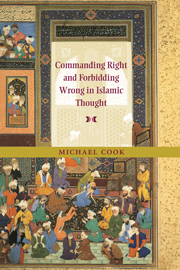Book contents
- Frontmatter
- Contents
- Preface
- Acknowledgements
- PART I INTRODUCTORY
- 1 THE GOLDSMITH OF MARW
- 2 KORAN AND KORANIC EXEGESIS
- 3 TRADITION
- 4 BIOGRAPHICAL LITERATURE ABOUT EARLY MUSLIMS
- PART II THE ḤANBALITES
- PART III THE MU'TAZILITES AND SHĪ'ITES
- PART IV OTHER SECTS AND SCHOOLS
- PART V BEYOND CLASSICAL ISLAM
- APPENDIX 1 Key Koranic verses and traditions
- APPENDIX 2 Barhebraeus on forbidding wrong
- Bibliography
- Postscript
- Index
4 - BIOGRAPHICAL LITERATURE ABOUT EARLY MUSLIMS
Published online by Cambridge University Press: 07 December 2009
- Frontmatter
- Contents
- Preface
- Acknowledgements
- PART I INTRODUCTORY
- 1 THE GOLDSMITH OF MARW
- 2 KORAN AND KORANIC EXEGESIS
- 3 TRADITION
- 4 BIOGRAPHICAL LITERATURE ABOUT EARLY MUSLIMS
- PART II THE ḤANBALITES
- PART III THE MU'TAZILITES AND SHĪ'ITES
- PART IV OTHER SECTS AND SCHOOLS
- PART V BEYOND CLASSICAL ISLAM
- APPENDIX 1 Key Koranic verses and traditions
- APPENDIX 2 Barhebraeus on forbidding wrong
- Bibliography
- Postscript
- Index
Summary
INTRODUCTION
Islamic biographical literature is varied, and often rich, in its genres. It offers collections of biographies of traditionists, judges, poets, grammarians, Koran reciters, exegetes, women and others. Yet before modern times the idea does not seem to have occurred to anyone to collect into a single work biographical material on those who commanded right and forbade wrong. This is a pity, since the existence of such a collection would have made the writing of this chapter much easier. Nevertheless, the broad range of biographical literature is our main source for the practice of the duty of forbidding wrong by individual Muslims, and it also provides incidental statements of their opinions on the subject. The material is uneven and often threadbare; on occasion a writer may tell us no more than that the subject of a biography was assiduous in performing the duty. But fortunately most references are not as bald as this, and the anecdotal detail we are sometimes given can be colourful and significant.
Although this body of material does not lend itself to systematic presentation, I shall attempt in this chapter to identify its more striking features. By way of introduction, I shall look briefly at what the Muslim sources have to say about pre-Islamic figures, followed by the Prophet himself. But the bulk of the chapter will be devoted to individual Muslims of the first two centuries of Islam, with some forays into the third. My coverage is subject to two major limitations.
- Type
- Chapter
- Information
- Commanding Right and Forbidding Wrong in Islamic Thought , pp. 46 - 84Publisher: Cambridge University PressPrint publication year: 2001



